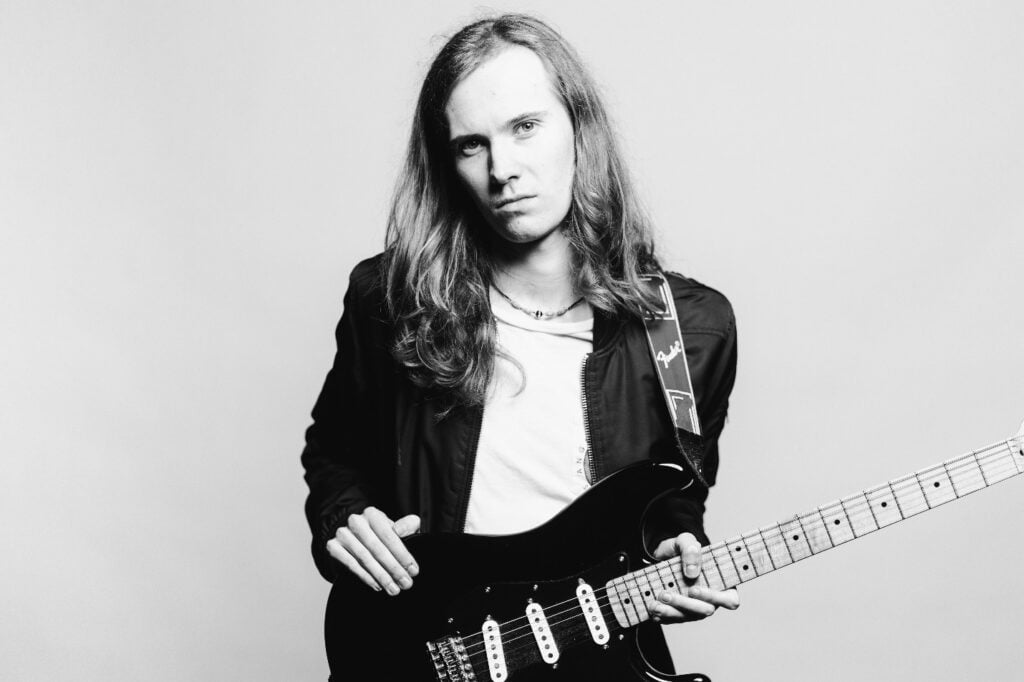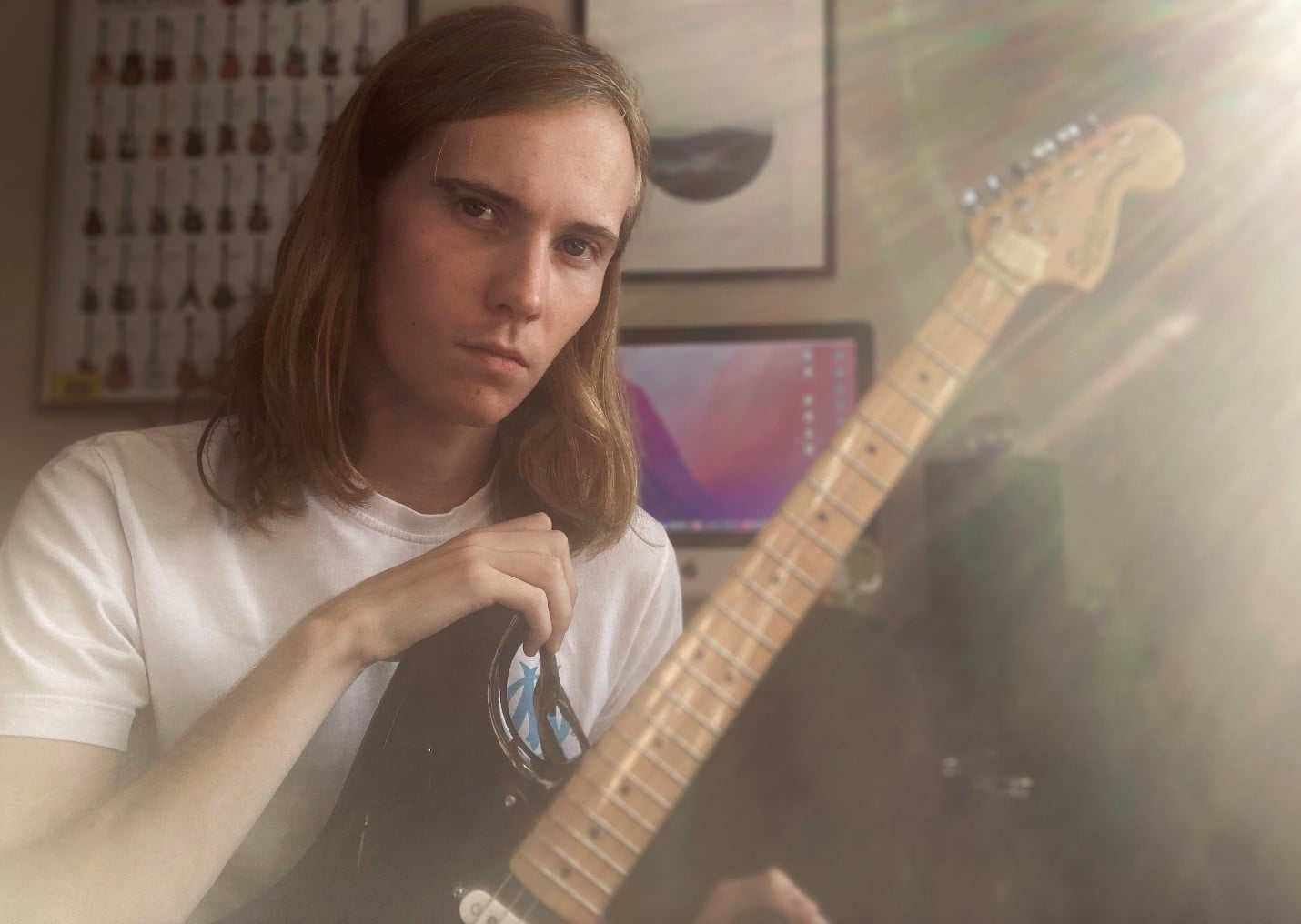Joe Murphy, a Progressive R&B guitarist and producer from Fleet in Hampshire, is 21 years old. He has appeared on BBC Music Introducing in the Solent. While studying piano and theory in secondary school and throughout his years of involvement in music, Joe began to develop his production skills using Propellerhead Reason (DAW). He then moved on to college where he worked with MOBO-nominated rapper “J Vessel.” Joe was mentored by Paul Geary (Nik Kershaw and Sister Sledge), Brian Henry (Soul II Soul and The Jackson 5) and Giorgio Serci (Yamaha and freelance guitarist) before arriving at The Academy of Contemporary Music in Guildford. Additionally, he has worked with up-and-coming R&B musician L’Rockett, whom he met through the academy’s label, and performed at the local Boileroom venue.
Two of Joe’s main influences are the neo-soul and lo-fi of Tom Misch and the soundscaping ambiance of David Gilmour, which are combined in his music. His tracks and guitar playing will transport you to a far-off, reverberating journey while bringing peace and melting all of your problems away if you enjoy relaxing and listening to music.
Joe produced and put out three singles through major streaming services in 2021, including “Prosperity,” his first release for a paying audience, “Get Out There,” and his most recent song, “Daylight,” all of which were played on BBC Radio Solent. Prosperity made an appearance on the same program as “Wet Leg” and their “Chaise Lounge” premiere. Working on his upcoming album “Tenfold” while on and off the Guildford campus is his next project. Release is planned for the fall of 2022. Check out his single “Prosperity” and the exclusive interview below:

1. Can you tell us a bit about where you come from and how you got started?
JOE MURPHY: Music has been by my side for as long as I can remember. However, I first became aware of the creative avenue of the industry around 7 years ago when I was studying Music Technology at school and vividly remember staring at this blank project on Reason (a DAW that I was using at the time) and just being overwhelmed at what it had to offer. That was where it really set me off; I would spend hours exploring tutorials online and that then lead me to using Logic Pro at College and eventually ending up at the Academy of Contemporary Music in Surrey where I really became confident about what I wanted to do into the future. I could go on forever, music has always stuck with me – it goes back a long way from when I first really started listening to music from such an early age!
2. Did you have any formal training or are you self-taught?
JOE MURPHY: A bit of both to be honest: I had some help from my Dad who is also a keen musician – he would show me the ropes here and there during the foundation of playing guitar (chords, arpeggios, scales, etc…), to then diving into YouTube and checking out guys like Marty Schwartz and Justin Sandercoe (Legends!)
In fact, I remember one time my Dad played some notes on the fretboard, to which I would name the notes in an instant thanks to the basic piano knowledge I had at the time – it quickly became clear to him and most of my family that I had perfect pitch, and over the years of playing guitar it has become beneficial during the production I do today.
3. Who were your first and strongest musical influences and why the name ‘JOE MURPHY’?
JOE MURPHY: David Gilmour. Hands down. I don’t say this about a lot of guitarists but he makes his Stratocaster speak a different language (metaphorically!). His unique sound and tone featured on The Dark Side of the Moon and The Wall, for example were a few reasons why I wanted to pick up a guitar and just start to play. My Dad also introduced me to more of the blues players such as Rory Gallagher and Joe Bonamassa, and they too shone a light on influencing others to do just the same: pick up and play.
One of my Dad’s business clients was the ex-CEO of Dominos Pizza: Chris Moore. Like me, really into music and very keen on discovering new artists. A few years ago, he sent over to my Dad “Beautiful Escape” by Tom Misch, and that just suddenly opened the door to being creative and exploring this new style and new vibe of music and creativity. As of today, he and his albums are one of my biggest reference points in what I get up to – I recommend watching some of his “In The Making” series and his Rhythm Roulette session on YouTube; he makes it look easy… Too easy…
I wasn’t really bothered about having a “stage” name or persona to be honest. Alanis Morissette is just “Alanis Morissette” and John Mayer is simply “John Mayer”. Maybe one day I could decide to switch things up…
4. What do you feel are the key elements in your music that should resonate with listeners, and how would you personally describe your sound?
JOE MURPHY: I feel like it’s up to the listener on how they symbolise my tracks. My idea behind my material is that I would like to think they are embarking on a journey through a mixture of progressive ambient soundscapes and the chill side of Neo-Soul and Lo-Fi. That’s what it’s all about: finding a soft space to unwind and in some aspects, take a leap of faith away from negativity.
The sound benefits from this as well: Spacious is one thing for sure, thanks to Logic’s ChromaVerb and Space Designer reverb plugins, but if I was totally honest I would say: clean, warm, and inviting.
All of which are familiar to R&B and Neo-Soul.

JOE MURPHY:
Thanks to Tom Misch’s production and tracks, I started experimenting and combining different genres whilst recording “Prosperity” during lockdown 2 years ago and during the early stages of that track, it overall sounded soulful, yet ambient and spacious. I then thought: “Why not combine R&B and Prog. together?…” Then, you’re off and away with ideas and extended reference points.
In music, you can get away with nearly anything. Creativity at its best!
6. What’s your view on the role and function of music as political, cultural, spiritual, and/or social vehicles – and do you try and affront any of these themes in your work, or are you purely interested in music as an expression of technical artistry, personal narrative and entertainment?
JOE MURPHY:
My music will never be based on politics. Besides, I can never keep up with it anyways! I understand if there are spiritual aspects to it based on the different sounds used and how one can calm their senses using music. Expression and narrative within music are SUPER important in the industry because your material defines who you are and what your skill sets are.
7. Do you feel that your music is giving you back just as much fulfilment as the amount of work you are putting into it, or are you expecting something more, or different in the future?
JOE MURPHY:
If you put effort and use your time wisely at anything, you’ll get the best of the results you were hoping for: That’s always been my strategy. I’d love to really push the limits and see where my material could be featured on. After a production or mixing session of a track, I occasionally conduct some research and explore the different sites, blogs, playlists, radio stations, etc… and simply reach out to them via E-Mail or DMs on Instagram. You end up wanting more if you ask me!
8. Could you describe your creative processes? How do usually start, and go about shaping ideas into a completed song? Do you usually start with a tune, a beat, or a narrative in your head? And do you collaborate with others in this process?
JOE MURPHY:
I usually start with a keyboard progression that I record directly into Logic, and then afterwards just noodle about on the guitar and discover some licks with a progression. I remember during “Daylight” the guitar tones were where I had the most fun; I would spend most of my time creating presets and recording different parts using the newly made presets, with my Stratocaster I was recording with. So it really just comes from just playing around and getting from A to B in a song arrangement. The structure, synth pads and drum patterns of “Prosperity” were a huge benefit going forward, and helped me to begin a new project from scratch, without getting lost in an empty project. I don’t usually collaborate as I’m quite an independent musician, but after listening back to some demos, I would quite like vocals on some tracks that are “in the pipeline”. Collaborating is important of course, and I hope to take advantage of that in the near future.
9. What has been the most difficult thing you’ve had to endure in your life or music career so far?
JOE MURPHY: I would say probably during the early stages of my production and certainly the distribution process, is having to get used to rejections and taking things personally. But as you slowly adapt to the creative world, these sorts of things are totally normal in the music industry and not everyone is a fan on R&B or Neo-Soul.
They either love your music or they don’t and that’s no negative thing at all. I always thought that if a playlist or radio station aren’t keen on your material, it encourages you to carry on and prove to yourself you can overcome these sorts of habits.
10. On the contrary, what would you consider a successful, proud or significant point in your life or music career so far?
JOE MURPHY: Having the chance to be involved with an interview with Illustrate! That for sure, and getting plugged on BBC Introducing Solent was a big moment in my journey as not only it motivates you to keep going with what you’re producing/performing, but it also broadens your music taste with what is being featured on the show and the connections you gain through social media. Never expected it to be honest, but it just goes to show:
Whatever genre, there will be that certain someone or something out there who will LOVE your music and what you do.
KEEP IN TOUCH:

Photo credits: Rob Blackham
